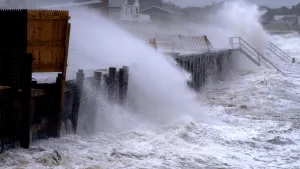Portable generators can pose dangerous risks - here’s how to stay safe during power outages
A storm like Henri could cause power outages, which means it may be time to break out the portable generator. But each year, hundreds of people are killed or injured in generator-related incidents.
•
Aug 21, 2021, 2:47 AM
•
Updated 1,356 days ago
Share:
More Stories
1:31

What's Cooking: Uncle Giuseppe's Marketplace's prime rib roast
134ds ago1:27

What's Cooking: Uncle Giuseppe's quiche lorraine
366ds ago2:34

Guide: Safety tips to help prevent home burglaries
430ds ago2:19

Guide: Safety measures to help prevent fires and how to escape one
578ds ago2:07

Tips on how to avoid confrontation with sharks while swimming in the ocean
662ds ago2:33

5 tips to prevent mosquito bites and getting sick from viruses
673ds ago1:31

What's Cooking: Uncle Giuseppe's Marketplace's prime rib roast
134ds ago1:27

What's Cooking: Uncle Giuseppe's quiche lorraine
366ds ago2:34

Guide: Safety tips to help prevent home burglaries
430ds ago2:19

Guide: Safety measures to help prevent fires and how to escape one
578ds ago2:07

Tips on how to avoid confrontation with sharks while swimming in the ocean
662ds ago2:33

5 tips to prevent mosquito bites and getting sick from viruses
673ds agoFrom refrigerators full of spoiled food to flood damage made worse by failed sump pumps, power outages caused by severe weather can have serious consequences.
A storm like Henri could cause power outages, which means it may be time to break out the portable generator. But each year, hundreds of people are killed or injured in generator-related incidents. These are incidents most experts say could be avoided.
“We test generators that range quite a bit in size,” says Paul Hope, of Consumer Reports.
Hope says that large portable generators will produce up to 10,000 watts – enough to power most homes. Smaller, recreational generators are intended more for camping, but they will do in a pinch.
“They’ll still produce 2,000 watts, so if it’s all you can get, that might be enough for a fridge, a deep freezer, some phone chargers,” says Hope.
RELATED: Live Updates TRACKING HENRI
Power center: Electric outage resources
But portable generators come with a risk. A report from the Consumer Product Safety Commission found that in the past decade, 711 people died of carbon monoxide poisoning due to portable generators. Thousands more were injured.
Fire department officials often warn residents during inclement weather to not run generators inside of homes.
In Mastic, on Long Island, four people were taken to the hospital with carbon monoxide poisoning last summer. A generator was found running in the basement.
Several people were found unconscious inside of a home in Rockland County in 2018. Firefighters found extension cords run to multiple rooms, all hooked up to a generator on the back porch.
And in East Orange, New Jersey, a mother and her 7-year-old daughter died after they were overcome by fumes. Authorities said that an improperly vented generator was to blame.
“It can build up huge levels of carbon monoxide to the point where you can pass out in just a few minutes of exposure,” says Hope.
There are a few things people can do to stay safe when operating a portable generator.
Only operate them at least 20 feet from the home. Never use a generator inside of the home or garage, even with the doors and windows open. And make sure battery-operated carbon monoxide detectors are installed in the home.
To avoid the risk of shock, do not use a generator in wet conditions and be sure to turn it off and let it cool before refueling. Gasoline spilled on a hot generator could ignite a fire.
Anyone who wants to use a portable generator to power their central air conditioner or certain appliances should have an electrician install a transfer switch from the electrical panel. This is something that will need to be planned in advance of a storm.
More from News 12

LIVE UPDATES: Ida's Aftermath
2:16

Scammers may take advantage of Henri flood victims. Here’s how to prevent becoming a victim
1:52

Great Neck soaked with nearly 6 1/2 inches of rain

Overstayed welcome? Henri takes its time drenching Northeast
1:35

Tropical Storm Henri leaves major flooding around LI, closes Robert Moses State Park
2:58
